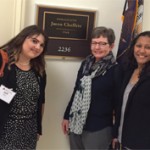On Sept. 12–13, ACR advocates will be back on Capitol Hill as part of the Advocates for Arthritis legislative fly-in. This annual event brings together rheumatology professionals and patients to advocate on behalf of the rheumatology community. The core issues on which the advocates will focus this year include advocating for dramatic changes to the Centers for Medicare and Medicaid Services (CMS) Medicare Part B Drug Reimbursement Project, support of research funding that benefits rheumatology professionals and patients and the repeal of Medicare “therapy caps.”
Here are a few suggestions for how to get involved throughout the year:
Help Strengthen the ACR’s Voice in Washington, D.C.
ad goes here:advert-1
ADVERTISEMENT
SCROLL TO CONTINUE
- Write, call or email your legislators. As a constituent, your opinions matter to those members of Congress who are elected to represent you. Speak up and let them know how you feel about important issues facing rheumatology.
- Schedule a meeting with your members of Congress in Washington, D.C. Meeting face-to-face with your legislators and their staff provides you the opportunity to educate them on the issues and helps you build and strengthen relationships.
- Be sure to involve your patients and staff; they are constituents, too. Encourage them to take advantage of the tools and resources available through the ACR’s Legislative Action Center and to write, call or email their legislators.
Set Up a Meeting with Your Elected Officials Locally
- Invite your legislators to your office, or meet with them in their district office. This is a great opportunity to educate members of Congress on the importance of the rheumatology subspecialty and the effect that arthritis and rheumatic diseases have on quality of life.
- Volunteer for a campaign. Volunteering is a great way to get involved in the political process. Support the candidate who will best represent the rheumatology community.
We must stay united to effect change. Contact your elected officials and make your voice heard. To find your legislators’ contact information or for more information on ACR advocacy activities, contact the ACR government affairs staff at [email protected], or visit rheumatology.org/Advocacy.


